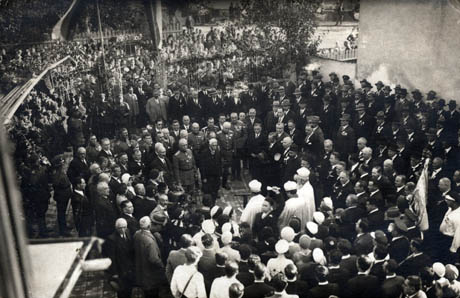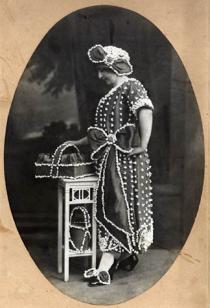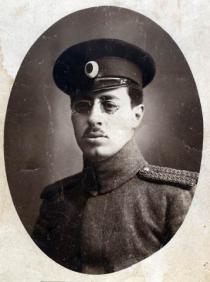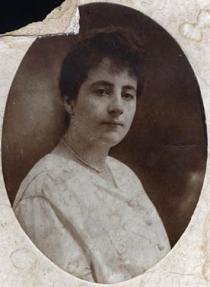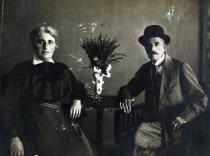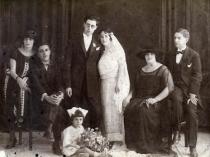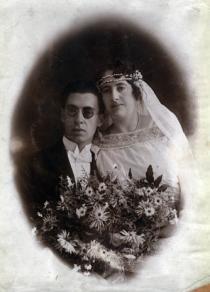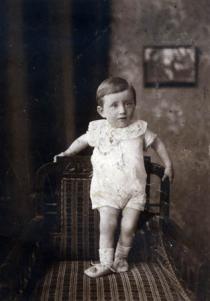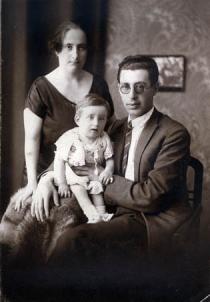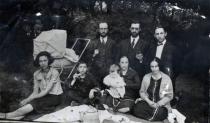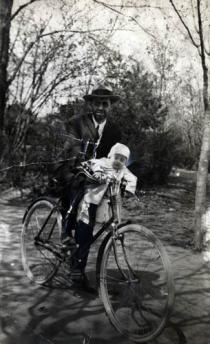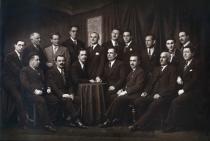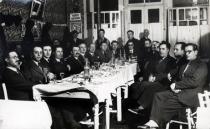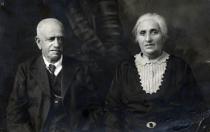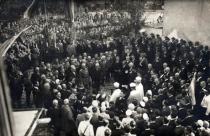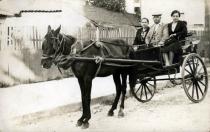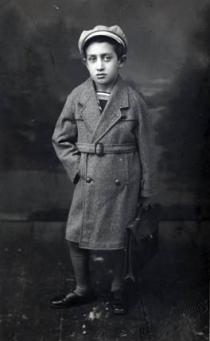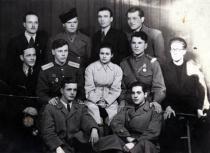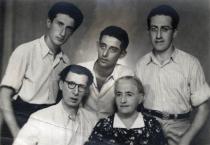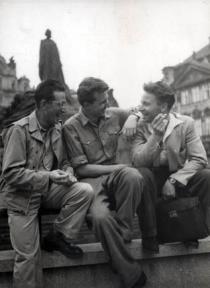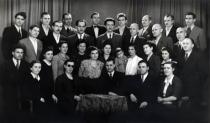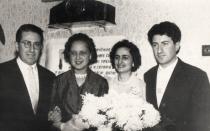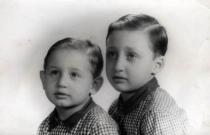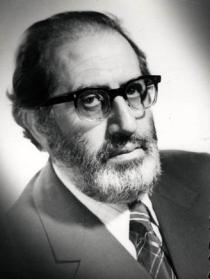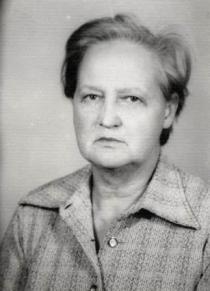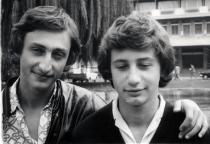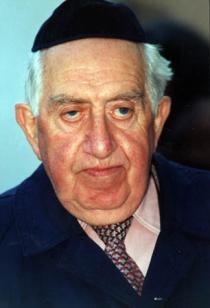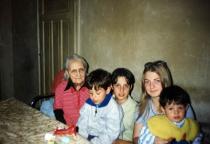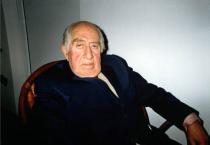This is a celebration of the official sanctification ceremony of the flag of the Jewish officers and soldiers of the reserve in the [Sephardi] synagogue in Ruse around 1933-34. I cannot point out my father on this photo.
In Ruse there were two synagogues: the Ashkenazi one and the Sephardi one. There was a chazzan, too. Haribi [rabbi] Naftali was the chazzan at the first one and haribi Tuvi was servicing the second one. There was a shochet, too - there was a chazzan and a mezamer. The chazzan was the chief one and mezamer was the one, who accompanied him, his assistant to the service. Bar mitzvah was made in both the synagogue and home. Mine was at home. A chazzan came with plenty of relatives and friends. He read and gave me the maturity certificate. Marriages were performed in the synagogue only according to the traditional ritual - the prayer was read and the respective certificate was issued [Ketubbah]. This was the routine in Ruse, [which was possible because Bulgarian Jews were not extremely religious and certain rituals had been adapted to the situation in Bulgaria] and I can't say anything more.
There was one Jewish school - a secondary school where we studied all the subjects taught in Bulgarian schools in Bulgarian language; in the primary school - up to the fourth grade Ivrit was taught. In the middle school we also studied Ivrit, Toldot [Hebrew for history], and Tannakh. There were Jewish children who were not sent to study in the Jewish school, because it was more difficult there - we studied in the mornings and in the afternoon. But when we reached the high school level we were completely prepared for it. I have a brother, Avram Merkado Natan. My brother is four years younger than me. He studied in the same schools as I did, but couldn't graduate from high school, because the Law for Protection of the Nation was introduced and he was not allowed to go to school. He couldn't graduate until 1947, after which he studied at the Technical University in Sofia.
The Jewish neighborhood was around David Street and the Jewish school. Almost all Jews lived there. There were also some Bulgarian families. In Ruse there were many Jewish tradesmen, successful ones. The trade with books was almost the whole in Jewish hands: the companies 'Sam Patak', 'Moisey Melamed', 'Rozanis&Co' and others. There were also many traders of haberdashery, clothes, and glass products. Beniesh had a large bookstore in the city center. Many doctors, and good ones, too, were from Jewish origin: Dr Menachem, Dr Versano, Dr Ovadia. One of the most famous dentists in the town was Dr Isakov, there were pharmacists, and druggists, too. Many lawyers were also Jewish, as well as some musicians. However, most of them were not professionals, they were amateurs. There was a 'David' chorus at the synagogue. In Ruse three musical comedies with a purely Jewish cast were performed - among them were 'Carmusinella' [no information available] and 'The Love of Schubert', based on musical compositions by Franz Schubert, as well as the 'The Bells of Cornville' [an opera-comique in 3 acts, 4 scenes; Music by Robert Planquette; adapted and arranged by Max Morris, first staged in 1877 in Theatre des Folies-Dramatiques, Paris]. I can't remember anything about the authors and the contents, because they were light ephemeral operettas - perhaps brought from abroad, Vienna maybe, which may be known only to the experts in operettas. There were attempts for Jewish theater performances with young people from Hashomer Hatzair - they played 'It's Hard to be a Jew' ('Shver Tzu Zein A Yid') by Shalom Aleichem. I can't remember anything about that, too, except for the topic was the Jewish life. It was probably also a foreign product, because I remember a Negro appearing, but I can't say anything more as far as the author and the content is concerned. They played in Bulgarian, too. There was a Jewish jazz band also, led by Albert Ventura who was a banker and a violinist. In summer they used to go and play in Varna - to have fun, because they were rich boys. A great musician was born in Ruse: Isak (Ziko) Gratsiani, who became the conductor of the Israeli military chorus later. I can't add any further information. I don't know any details about his life, because he left for Israel after 1944 and our paths separated. [There is no information available on him].
The Jews had a good standard of living. Almost everywhere they had running water and electricity. In several slums for the poor people they had everything outside their houses, but such houses were a very rare thing to see. A big Jewish organization, 'Malbish Arumim' was in charge of providing food and clothes to the poor people. In autumns they used to buy them winter clothes and shoes, there was also a communal canteen. There was no anti-Semitism before the introduction of the Law for Protection of the Nation. But there was no anti-Semitism after this law, too - I mean - declared and rude one. [Editor's note: He probably means although the anti-Semitic laws were introduced it was still little felt in the every day reality.] There was one pro-fascist organization 'Country Defense', as well as 'Ratnik', but nobody offended me because of my Jewish origin while I was a schoolboy in the high school, even after we had to wear those yellow stars. None of my classmates has ever insulted me, because we were good students. They respected us. There wasn't any anti-Semitism among the people in Bulgaria. The anti-Semitism was on institutional level - stemming from the laws and regulations. But even in the period when we had to wear those yellow stars - there wasn't any negative attitude to us.
